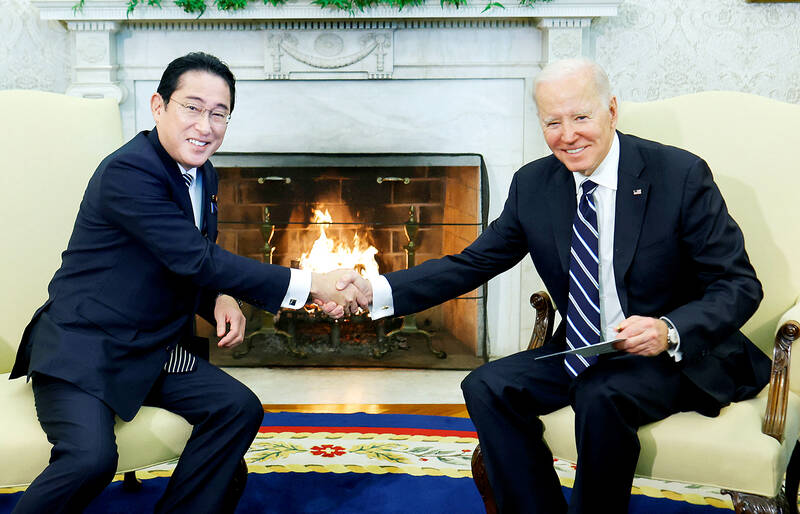The US and Japan on Friday said that maintaining peace and stability across the Taiwan Strait is essential to security in the Indo-Pacific region.
The joint statement was released by the White House after a meeting in Washington between US President Joe Biden and Japanese Prime Minister Fumio Kishida to discuss their countries’ alliance and security issues, including possible conflicts in the Taiwan Strait.
“We emphasize that our basic positions on Taiwan remain unchanged, and reiterate the importance of maintaining peace and stability across the Taiwan Strait as an indispensable element of security and prosperity in the international community,” the statement said.

Photo: Reuters
“We encourage the peaceful resolution of cross-strait issues,” it added.
Biden and Kishida said that their alliance remains the cornerstone of welfare in the Indo-Pacific region.
However, they also recognize that the challenges their countries face transcend geography, particularly as a result of the war in Ukraine.
“United across the Atlantic and Pacific oceans, we have stood together in firm opposition to Russia’s unjust and brutal war of aggression against Ukraine, and we will continue to impose sanctions on Russia, and provide unwavering support for Ukraine,” the statement said.
The leaders also exchanged their views about the Indo-Pacific Economic Framework, a US-led multilateral partnership involving 13 other countries, including Japan, that has been touted as a bulwark against China’s growing economic influence in the region, it said.
“As inclusive democracies, we will ensure economic prosperity is broadly shared across our societies and recommit to achieving gender equity and equality as well as women’s empowerment,” the statement said.
Meanwhile, Biden and Kishida also urged Beijing to do its part to report epidemiological and viral genomic sequence data regarding the spread of COVID-19 across China to enable global public health officials to identify possible new variants and to reduce their spread.
In Taipei, Ministry of Foreign Affairs deputy spokesperson Hsiao Kuang-wei (蕭光偉) yesterday said: “Maintaining peace across the Taiwan Strait has clearly become the consensus of the international community, in the face of China’s expansionism, which challenges the global democratic order, and has aroused the concerns of liberal and democratic countries worldwide.”
Taiwan is bolstering its self-defense capabilities and resisting threats to its sovereignty, Hsiao said.
“We will also deepen cooperation with the US, Japan and other like-minded countries to safeguard the security of the Taiwan Strait, jointly promote development in the Indo-Pacific region, and ensure peace, stability and economic prosperity,” he said.

ENDEAVOR MANTA: The ship is programmed to automatically return to its designated home port and would self-destruct if seized by another party The Endeavor Manta, Taiwan’s first military-specification uncrewed surface vehicle (USV) tailor-made to operate in the Taiwan Strait in a bid to bolster the nation’s asymmetric combat capabilities made its first appearance at Kaohsiung’s Singda Harbor yesterday. Taking inspiration from Ukraine’s navy, which is using USVs to force Russia’s Black Sea fleet to take shelter within its own ports, CSBC Taiwan (台灣國際造船) established a research and development unit on USVs last year, CSBC chairman Huang Cheng-hung (黃正弘) said. With the exception of the satellite guidance system and the outboard motors — which were purchased from foreign companies that were not affiliated with Chinese-funded

PERMIT REVOKED: The influencer at a news conference said the National Immigration Agency was infringing on human rights and persecuting Chinese spouses Chinese influencer “Yaya in Taiwan” (亞亞在台灣) yesterday evening voluntarily left Taiwan, despite saying yesterday morning that she had “no intention” of leaving after her residence permit was revoked over her comments on Taiwan being “unified” with China by military force. The Ministry of the Interior yesterday had said that it could forcibly deport the influencer at midnight, but was considering taking a more flexible approach and beginning procedures this morning. The influencer, whose given name is Liu Zhenya (劉振亞), departed on a 8:45pm flight from Taipei International Airport (Songshan airport) to Fuzhou, China. Liu held a news conference at the airport at 7pm,

Taiwan was ranked the fourth-safest country in the world with a score of 82.9, trailing only Andorra, the United Arab Emirates and Qatar in Numbeo’s Safety Index by Country report. Taiwan’s score improved by 0.1 points compared with last year’s mid-year report, which had Taiwan fourth with a score of 82.8. However, both scores were lower than in last year’s first review, when Taiwan scored 83.3, and are a long way from when Taiwan was named the second-safest country in the world in 2021, scoring 84.8. Taiwan ranked higher than Singapore in ninth with a score of 77.4 and Japan in 10th with

GRIDLOCK: The National Fire Agency’s Special Search and Rescue team is on standby to travel to the countries to help out with the rescue effort A powerful earthquake rocked Myanmar and neighboring Thailand yesterday, killing at least three people in Bangkok and burying dozens when a high-rise building under construction collapsed. Footage shared on social media from Myanmar’s second-largest city showed widespread destruction, raising fears that many were trapped under the rubble or killed. The magnitude 7.7 earthquake, with an epicenter near Mandalay in Myanmar, struck at midday and was followed by a strong magnitude 6.4 aftershock. The extent of death, injury and destruction — especially in Myanmar, which is embroiled in a civil war and where information is tightly controlled at the best of times —